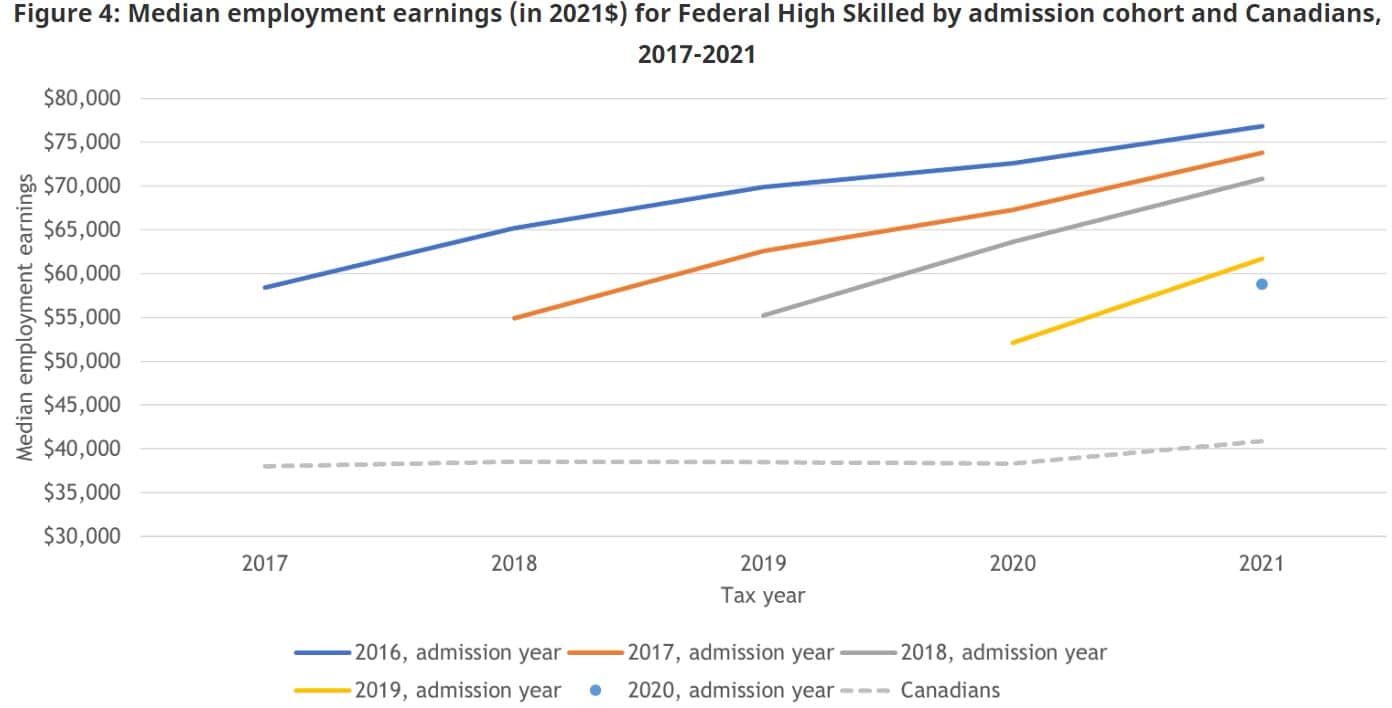Newcomers who immigrate to Canada through the Express Entry-managed program often see their average employment earnings increase rapidly during their first five years in Canada.
This is according to the 2023 year-end Express Entry report. Immigration, Refugees and Citizenship Canada (IRCC) has included data that shows that the average income of newcomers through the Express Entry managed program is higher than that of Canadian-born people.
This data analyzes the average employment earnings of Express Entry candidates admitted between 2016 and 2021.
Get a free Express Entry assessment
Consistent growth in income
Since its launch in 2015, Express Entry candidates have consistently received positive long-term economic outcomes.
For example, the 2023 report found that 2016 freshmen admitted had a median employment income of $58,400 in 2017, which rose to $76,800 in 2021 (five years after landing). It also noted that freshmen admitted in 2018 earned an average of $55,200 in their first year, which rose to $70,800 three years after admission. This suggests that salaries for freshmen increased more rapidly.

Average employment earnings for Canadians remained relatively flat across all five years and remained notably low, starting at $38,006 in 2017 and rising to only $40,870 in 2021.
Often, newcomers arriving through federal high-skilled worker programs, such as those managed by Express Entry, are well-suited to meet Canada’s labour market needs. They are invited to apply for permanent resident status based on their Comprehensive Ranking System (CRS) score, which evaluates candidates’ in-demand human capital attributes such as language, ability, work experience, occupation, age and education. IRCC views those with the highest CRS scores as those most likely to successfully integrate into the Canadian economy.
In 2023, IRCC takes this concept a step further by introducing category-based selection rounds of invitations. In these draws, Express Entry candidates are invited based on a specific specialty, often based on their work experience, rather than an overall high CRS score. Data on the economic outcomes of these newcomers is not yet available.
By comparison, economic immigrants who entered Canada through the non-Express Entry-aligned stream of the Provincial Nominee Program (PNP) have lower average wages. The report notes that average employment earnings for PNP entry groups ranged from $40,000 to $50,000 in one year since admission, with a difference of 1.5% among entry groups.
Additional scoring factors have little impact on earnings
The report states that additional factors included in the Express Entry application may affect average earnings. However, based on the report’s data, results suggest that additional scoring factors do not result in higher average earnings two to three years after entry, unless candidates have the highest possible scores for these attributes.
For example, it found that applicants who were admitted to Canada in 2019 and had a post-secondary credential of three years or more from a Canadian institution had slightly higher average employment earnings than those who did not have a Canadian post-secondary credential.
In contrast, those admitted with a 1–2 year post-secondary Canadian credential in 2019 had lower median incomes than those with no post-secondary education in Canada ($51,000 vs. $61,100).
The same was true for those with siblings living in Canada. For those who arrived in 2019, the average salary two years after arriving in Canada was $53,100 for those who had a Canadian or permanent resident sibling, compared to $61,200 for those who did not have a Canadian or permanent resident sibling.
Arranged employment was the only additional scoring factor that showed a higher average income. However, income levels were also found to depend on the type of employment. Those with a pre-arranged job offer in a senior management role who arrived in Canada between 2017 and 2019 all had an average income of over $200,000 two years after landing.
People who already had employment in other occupations also had a higher average income than those who did not already have any employment. For example, those who came to India with an “other” job offer in 2018 had an average income of $84,500, while those who had no arranged employment had an average income of $60,700.
Get a free Express Entry assessment


